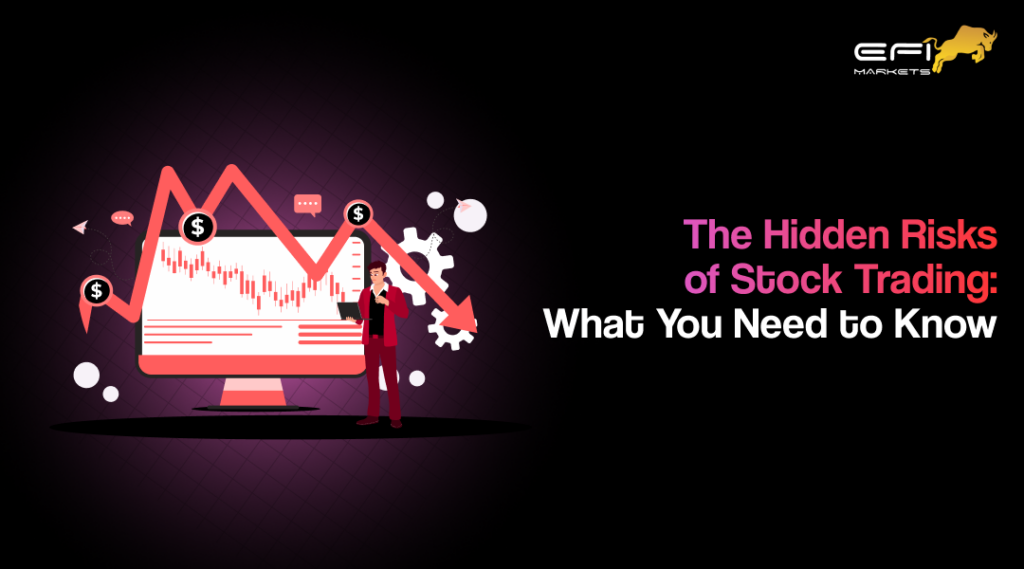
Risks of Stock Trading
Risks of Stock Trading market promises excitement and potential wealth, but it also holds hidden risks that can challenge even seasoned traders. Understanding these risks is essential to make informed decisions and avoid unexpected losses. This guide will walk you through the primary hidden risks of stock trading and help you navigate them effectively.
1. Market Volatility: The Unpredictable Roller Coaster
The stock market is influenced by a variety of factors that can change suddenly and dramatically. Events like economic downturns, political upheavals, and even natural disasters can lead to volatility, causing stock prices to swing up and down. For example, during global crises, like a recession, stock values can drop significantly within days or hours.
How to Manage Market Volatility:
- Diversify your investments to spread risk.
- Invest long-term to ride out short-term market fluctuations.
- Stay updated on global events that might impact markets.
2. Emotional Investing: The Psychological Trap
Emotions are powerful but can often mislead us in trading. The fear of missing out (FOMO) and the desire for quick profits can lead investors to make impulsive decisions, such as buying overhyped stocks or selling at the first sign of loss. These emotional reactions often result in losses.
Tips to Avoid Emotional Investing:
- Set clear goals for each trade and stick to them.
- Follow a trading plan and avoid making decisions based on market noise.
- Practice patience and avoid daily stock checks if they increase your stress.
3. The Risk of Leverage: A Double-Edged Sword
Leverage allows traders to borrow money to increase their buying power, which can lead to greater profits. However, leverage is a high-risk tool; losses are amplified when the market moves unfavorably, often leaving traders in debt. Many new traders underestimate how quickly leverage can turn against them.
Leverage Carefully:
- Start small with leverage, if at all, until you’re confident in your trading strategy.
- Have a stop-loss plan to exit trades before losses grow too large.
- Educate yourself about the true cost of leverage, including fees and margin requirements.
4. Regulatory Risks: The Rules Aren’t Always Clear
Stock markets are regulated by governments, which means that changes in regulations or government policies can impact your investments. These changes can affect trading costs, restrictions on certain stock types, or even what you’re allowed to trade.
Managing Regulatory Risks:
- Stay informed on policy changes affecting your investment type or location.
- Choose a reputable broker who stays compliant with regulations.
- Read news from reliable sources to catch early warnings about regulatory shifts.
5. Hidden Fees and Costs: Small Charges That Add Up
Many traders overlook fees like transaction charges, brokerage fees, or costs associated with certain account types. These charges, while small individually, can add up quickly, especially for active traders, eating into profits over time.
Reducing Hidden Costs:
- Compare brokers to find the best rates for your needs.
- Limit overtrading to reduce transaction fees.
- Check fee structures and understand any hidden charges that may apply.
6. Information Overload: Analyzing Too Much Data
With the internet, traders have access to vast amounts of data and stock analyses, which can be overwhelming. When traders try to make decisions based on too many sources, they often end up confused and make inconsistent choices.
Simplifying Your Analysis:
- Focus on reliable sources that you trust for consistent information.
- Create a personal strategy based on clear and manageable criteria.
- Limit your sources to avoid conflicting advice that clouds your judgment.
Conclusion: Balancing Risks with Informed Decisions
While stock trading can be profitable, it’s crucial to understand and manage the hidden risks involved. Taking proactive steps to limit exposure, keep emotions in check, and avoid common pitfalls will help you trade with more confidence. Remember, every trade carries some risk, but with a well-thought-out strategy, you can improve your chances of success and avoid the traps that often lead to losses.
